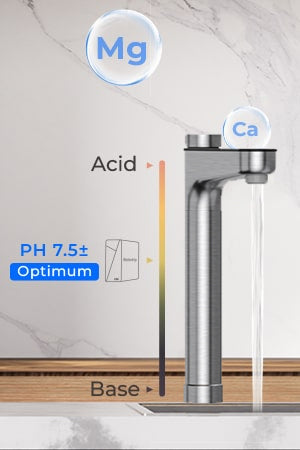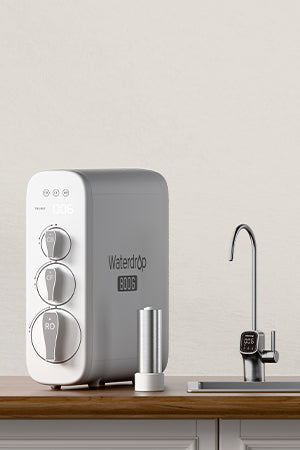Water is often seen as a panacea of life and is a necessity
for the daily consumption of the individual. We use it for cooking and washing, without which we cannot work
However, an unpleasant water supply can have a detrimental effect in several ways. How
What does water taste like and what are the underlying causes of its taste? After you have
Factors that lead to unpleasant, sweet and potential effects on turbidity or transparency
invest in
Waterdrop
Reverse osmosis filter for residential purposes seems logical.
Does the water smell?
Many claim that water has no unique taste properties. In
In fact, it is a being that is essentially not designed to have a taste. On the other hand,
On the other hand, for most people who get water from the tap or well every day, this is only sometimes
the case. After sampling water from different sources, one can discover nuances in the taste.
Some can be truly disgusting, while others leave only a faint aftertaste.
The water has a taste because it lacks pure H2O. During processing
Various substances are dissolved in the water or introduced into the water to prevent the proliferation of bacteria
and other organic substances. People have different taste receptors and
different abilities to process sensory information, which means that every person
tastes different. One person may think that the water is pure, while another may have more unpleasant encounters
can have.
Reasons for the smell in the water
Although unpleasant feelings are subjective, many people emphasize the negative
aspects when asked about the taste of water. The taste of water has three
Main sources: inherent minerals, additives contained in the processing systems, and
Residues from pipes and other equipment. The latter is essentially the responsibility of the
owner, and the only remedy is to improve the piping system.
The first two factors depend on the geographical origin and use
of water resources. This also applies to bottled water. The concentration of minerals in the water and
the concentration of chemicals required for safe consumption by humans will be
measured in parts per million. Common substances that affect the taste of water are bicarbonate,
Magnesium, calcium, iron, chloride and sulfate. Other components may include salt, potassium and several other
substances.
Distilled water is the only form that is free of minerals or other
particles. It is not recommended to consume every day, even if it is pure in the end. Minerals are
crucial for maintaining optimal health of the body. This argument speaks strongly
for reverse osmosis filters that effectively eliminate contaminants while maintaining the overall benefit of
Maintain drinking of clean water.
The taste of sweet water: Why is it so?
Water has a pleasant taste because it contains minerals. Sugar is not
in taps or healthy water for residential or commercial establishments. Choosing a bottle of juice instead of
clean water in the store is not unintentional. This taste can be caused by too much iron and
calcium content in the water.
There are other options. If you are currently eating very salty or bitter
If you have eaten food, the water may be sweet. In case of severe dehydration and severe thirst, the
Individual water taste can be increased. Occasionally, people diagnosed with diabetes
will also encounter this phenomenon.
Taste and turbidity-the culprits behind cloudy water
The unpleasant taste can sometimes be accompanied by cloudiness.
Transparency of the water is determined by the presence of suspended matter, which can lead to
the water looks cloudy or clear. If the tap water is not clear, your
Water companies may issue a warning instructing you to either boil water or leave it for a
not to drink for a certain period of time. Water can also experience this. However, it is your responsibility to
Regardless of the solution used or the length of the wait, concerns
regarding water quality, especially if the water quality contains chlorine or chemicals
smelled.
The main causes of turbidity include the presence of sludge, which
due to inadequate filtration or the development of organic substances from water supply or
treatment systems have been damaged. These factors can affect the taste and nutritional value of the water
significantly influence.
Surplus minerals, processing chemicals, and turbidity-inducing particles contribute
to the undesirable taste, odor, and overall unsuitability of water for consumption, cooking, and washing
purposes. Improve water quality by using a reverse osmosis filter. A broad range of alternatives are available
for various environments, ranging from large RO filters that can handle an entire home to smaller ones that are
ideal for a break room in an office.
How Reverse Osmosis Filters Change the Taste of Water
If your response to the taste of the water is not attractive, a
Reverse osmosis system may be the best choice for you.
800 GPD Tankless RO System with UV Sterilization Light and Intelligent
Faucet - Waterdrop G3P800
€840.33
Many people prefer the smell of water from a tap or well.
They resort to expensive bottled water, which due to the large number of plastic bottles leads to
environmental disputes.
However, the taste must be more perfect and clear. In addition, access
to boiling water for domestic use or ensuring access to drinking water for the
personal hygiene, childcare, pet care, laundry and dishwashing.
Presence of unpleasant water can be effectively eliminated by using reverse osmosis systems under the
water tank or home water filter systems.































































